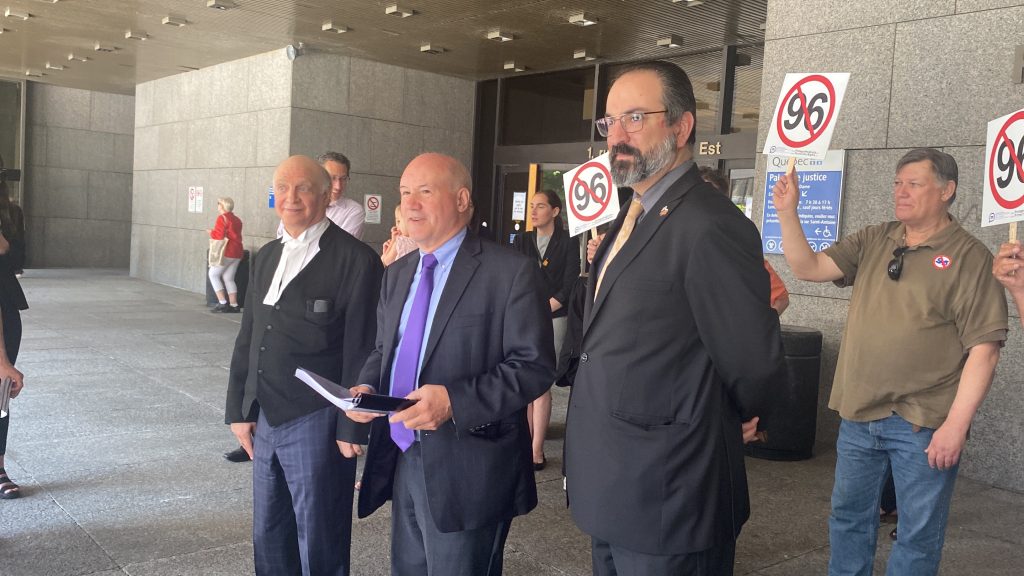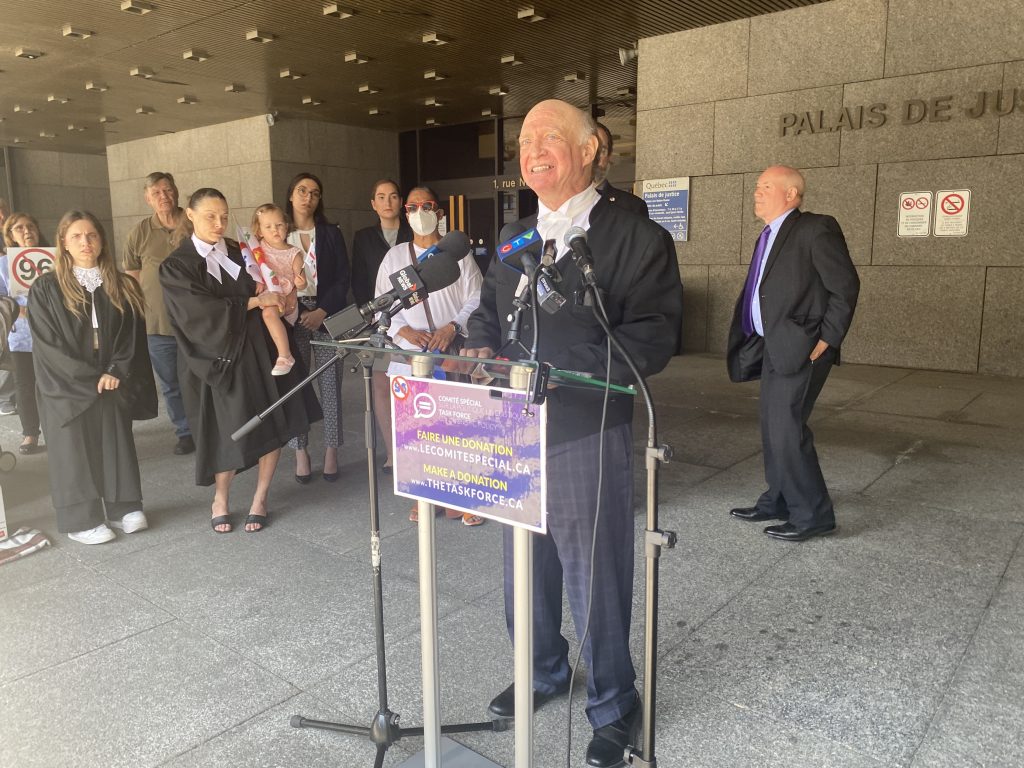Group opposing Quebec’s Bill 96 launches lawsuit against province’s new language law

Posted May 31, 2023 10:43 am.
Last Updated May 31, 2023 6:39 pm.
A group opposing Quebec’s Bill 96 is filing a lawsuit against the new language law Wednesday morning.
The “Task Force on Linguistic Policy” was at the Montreal courthouse to depose the challenge.
Today we are obliged to take the Quebec government to court to ensure our rights are respected,” said Andrew Caddell, president of the Task Force.
Some task force members held picket signs with the number 96 struck out in red outside the Palais de Justice.
Bill 96, which came into effect last June, tightened the province’s language laws and affirmed that French is Quebec’s only official language. It reinforced the use of French across several institutions, including the education and justice systems.
Several provisions of Bill 96 come into effect Thursday.

The “Task Force on Linguistic Policy” launches lawsuit against Bill 96 outside the Montreal courthouse May 31, 2023. (Alyssia Rubertucci/CityNews)
While it does encourage the use of French in the province, the “Task Force on Linguistic Policy” wants public services offered in both languages across Canada. The advocacy group also believes Quebec policies promoting French should not interfere with “constitutionally guaranteed rights and freedoms.”
“I think there are positives in that they attempt to encourage French,” said Caddell. “But there’s so many parts that are negative and that’s what our cases focus on – on how individuals are affected.”
On June 1, only Quebecers that received the majority of their education in English, deemed “historic Anglos,” will be able to receive government services in English. Newcomers will be denied access to English services after six months.

Don Ramsey outside the courthouse as the “Task Force on Linguistic Policy” launches a lawsuit against Bill 96 May 31, 2023. (Alyssia Rubertucci/CityNews)
“It affects my wife who is not born here, she might find an unhappy bureaucrat who will deny her English service,” said Don Ramsey. “I’d like this to be a place that people want to come to, not a place that most of my relatives have left over the decades.”
Businesses of any size will only have access to French government services and those with five to 49 employees will have to start declaring the proportion of their workforce that is unable to communicate in French in the business register.
“On the 1st of June, a lot will change, and we we focused on this day so that we could both provide a warning, but also ensure that we were present in this entire debate,” said Caddell.
Last month two Indigenous groups went to court over Quebec’s French language reforms, saying the legislation infringes on their rights to self-determination and to teach children their ancestral languages.

The “Task Force on Linguistic Policy” launches lawsuit against Bill 96 outside the Montreal courthouse May 31, 2023. (Alyssia Rubertucci/CityNews)
The Task Force is arguing many sections of Bill 96 are unconstitutional.
“The idea that minority rights can be set aside is greater than the idea of language or bilingualism or identity,” said constitutional lawyer for the Task Force, Michael Bergman. “It’s about the fact that we live now in society where the will of the majority, in any case deemed appropriate by the government, shall take precedence over minority rights.”

Constitutional lawyer, Michael Bergman. (Alyssia Rubertucci/CityNews)
On “historic Anglos,” the government said they would operate in good faith, without requiring proof to receive English services.
“When the government attempts to put us into a box of historic Anglos based on whether we received education at the elementary or high school level somewhere in Canada, that is intentionally excluding hundreds of thousands of members of our community,” said former Liberal MP and member of the Task Force, Marlene Jennings.
The lawsuit is entirely crowdfunded, representing six plaintiffs: a police dispatcher, an entrepreneur, a retiree, a teacher, the mother of a boy with autism spectrum disorder and a woman with a chronic disease.
The case is expected to be heard in court in early July.
“I think at some point we have to say to laws like this, that our Francophone co-citizens say is good for French, but they don’t realize how discriminatory they are,” says Caddell. “And we have to speak up to explain to them that it is discriminatory.”








